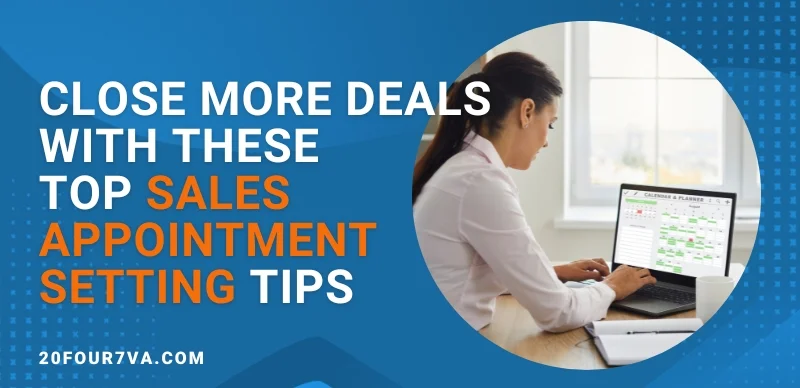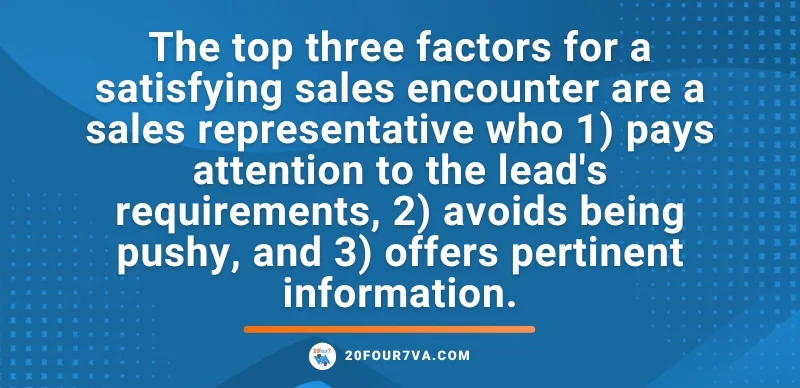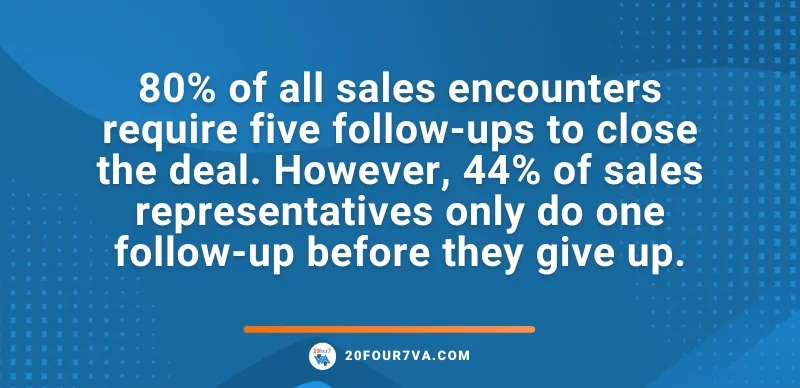Close More Deals with These Top Sales Appointment Setting Tips

Setting a sales appointment is a crucial step in the sales process. Successfully completing this step signifies that you’re one step closer to closing the deal. Booking an appointment with a prospective client is a great opportunity to give them a clearer idea of how you can add value to their business.
What is Appointment Setting?
Appointment setting is the activity in the sales process when a business engages with a lead to schedule a meeting, whether virtual or in-person. This meeting is an opportunity where the sales team can discuss their product or service with a prospective client to close a sales deal.
What are Some Sales Appointment Setting Tips?
Appointment setting is an important part of the sales process, but it can also be a tricky one if you don’t have the right tips and tools. Here is how to set sales appointments and tips to close more deals and increase your sales:
Establish Your Objectives
Before setting up appointments, it’s important to establish your objectives. Ask yourself what you hope to achieve from the meeting and how you want to measure success. Having a clear goal will help you create a successful sales appointment.
Use Automation
Automation can be a powerful tool when it comes to setting appointments. Automated email reminders, text messages, and notification systems can be used to streamline the process and ensure that all appointments are kept on track.
There are a variety of tools available to help you with appointment setting. From customer relationship management systems to appointment scheduling software, these excellent tools can help you stay organized and ensure that your appointments are successful.
Recommended reading: What sales and marketing automation tools do top businesses use?

Personalize Your Approach
According to a study by Hubspot, the top three factors for a satisfying sales encounter are a sales representative who
- pays attention to the lead’s requirements,
- avoids being pushy
- offers pertinent information.
It’s important to do your research when setting an appointment. Make sure you know as much as you can about the prospect and their needs before setting up a meeting. Doing your research ahead of time will help you tailor your pitch so you can make a stronger connection with the prospect.
Before you’ve even reached this stage, you should already have a clear idea of your target customer. Knowing the different buyer personas from front to back will help you personalize your approach at every step of the customer journey, including when setting a sales appointment.
Consider Time Zone Differences
When you’re targeting companies across the country or even the whole world, it’s important to be mindful of the time difference. Make sure you have appointment windows for virtual calls that are aligned with your prospective client’s business hours. This way, you can widen your reach and make your target clients feel that you’re already thinking of their convenience even when no sale has been made… yet.
Use Multiple Channels
Each lead will have their preferred communication channel. When it comes to setting appointments, some may prefer clicking over a link via email, while others prefer speaking with a sales rep over the phone. It’s best to have multiple channels to ensure that you can connect and set a sales appointment. But remember: contacting prospects is a balancing act of persistence and not overwhelming the lead.
Set Clear Expectations
Aside from giving an introduction to how your business can provide value to a prospect, it’s also important to paint a clear picture of what leads can expect when they do say yes to a sales appointment. When done well, you can encourage more leads to book an appointment with your sales team. Make sure the prospect knows who they will be meeting and where the meeting will take place. You can also consider sharing a quick agenda of what they can expect to learn.
It’s essential to value and respect other people’s time. Being clear about how long the session is makes things more simple for both parties. You can tailor-fit your presentation to fit the agreed-upon appointment and reserve time for questions or clarifications. And your lead will be able to block off their schedule and focus on listening to what you’re offering without worrying about your appointment creeping into other parts of their day.
Need help booking those sales appointments? Discover the ease of working with virtual appointment setters? Schedule a free discovery call with us to get started!
Use a Script
It’s best to keep things snappy when trying to set a sales appointment. Whether it’s a phone call or an email, anything too long can make your leads lose interest or feel like they’re wasting their time.
Your script should be aligned with your company’s goals and brand voice. And at the same time, it should flow nicely to get the conversation heading in the right direction (i.e., setting an appointment with your prospective client). If you’re unsure how to get started, below is a simple outline for your reference:
- Introduction: This is a quick one-liner to introduce yourself and the company you’re calling on behalf of. If you’re on a voice call, this is also a chance where you can ask the lead whether they are free to chat. Ask something simple like, “Is this a good time to have a quick call?” Doing so shows you respect the lead’s time and ensure they’re willing to hear the rest of the pitch. And you get the prospect’s express permission to listen to your pitch.
- Elevator Pitch: This is the part of the script where you give a snapshot of what your company does.
- Pain point/s: Bring it back to the lead by raising a pain point that they may be experiencing.
- Value statement: At this part, you can open up the option of setting a sales appointment. Highlight how your business can add value to the client by addressing the identified pain point and how you can discuss it further during a 20- to 30-minute meeting.
- Closing statement: Offer available appointment slots, but let them choose. Here’s an example for when you’re on a call: “I’m looking at my calendar, and it looks like I am available this Wednesday and Thursday from one to 3 in the afternoon. How does that sound?”
Of course, aside from a good script, you need to be able to bounce off what your lead replies with. It’s best to come up with “rebuttal scripts” or scripts that you use for more unfavorable scenarios. These scripts typically have these elements:
- Acknowledgment of the prospect’s concern
- Redirection to a question that will help to learn more about the prospect’s challenges or blockers. Or you can redirect and highlight a value you can bring that can address or alleviate their concern.
Follow Up
According to Brevet, 80% of all sales encounters require five follow-ups to close the deal. However, 44% of sales representatives only do one follow-up before they give up.
Following up with the customer after the appointment setting process is just as important as setting the appointment in the first place. Following up with the customer will help you build a stronger relationship and increase the chances of closing the deal.
Additionally, it’s a good way to confirm their interest in your product or service. And if they’re not interested, you can work on finding new leads to pursue.
Track Performance
An excellent way to ensure that you’re maximizing your sales appointment scheduling efforts is by regularly tracking your performance. This way, you can better identify areas of improvement. Here are two sales appointment setting metrics you should start tracking:
- Call or Contact Volume: This is the number of unique contacts your business has made. You can break this down into different channels: calls, emails, live chats, etc.
- Appointment Setting Percentage: It’s the percentage of the unique contacts that booked a sales appointment.
Tracking these metrics can help you pinpoint which channels offer the highest conversion. You can prioritize a specific channel that delivers more leads and sales appointments. At the same time, you can find ways to improve your sales appointment-setting process in channels that aren’t performing as well.
Want to boost your sales appointment setting metrics? Hire a sales virtual assistant to help you book more appointments! Simply book a free consultation with our Growth Experts to get started.

Hire a Remote Appointment Setter
Appointment setting is an important part of the sales process, but it doesn’t mean you need to spend your hours on this task. If you’re a business owner or a sales agent, it’s best to delegate this essential yet time-consuming task to an appointment setter.
Appointment setters can help you book those sales appointments, so you can focus on your core responsibilities. And since this task can be done remotely, you can get a virtual assistant to take over the appointment setting for you. This gives you all the benefits of hiring an in-office staff but at a fraction of the price.
Why Hire a Virtual Assistant for Setting Sales Appointments?
With a VA for sales appointment setting, you can free up more time while saving on overhead costs. All while you regain control of your time to focus on your executive functions.
Focus on Your Core Tasks
Hiring a remote appointment setter means hiring someone whose primary focus is booking calls or appointments. They can invest most of their energy in making sure you engage with your leads and have them book a sales appointment. At the same time, you can focus on more high-level tasks like fine-tuning your sales strategies or closing actual deals.
Save Time
Handling the task of setting sales appointments may not be the best use of your time as a business owner or sales manager. While this is essential to moving a lead along the sales funnel, you’re better off delegating this task. To help you save time, you can hire an effective VA to ensure your calendar is filled with sales appointments and prospects ready to be converted into actual customers.
Save Money
Remote staffing solutions are an excellent option for businesses looking to grow without bloating costs. With remote staffing, you can hire skilled remote talents from across the world. They’ll be supporting you remotely, so you won’t need to worry about expenses like office equipment, transportation allowances, and other costs typically associated with hiring in-house staff. They can do what in-house appointment setting specialists can do but at a fraction of labor and other overhead costs.
What Can a Sales Appointment Setter VA Do?
A sales appointment setting virtual assistant’s primary focus is to book sales appointments for your business. They can do this in various ways depending on your business needs and sales strategies. Here are some typical tasks you can delegate to your appointment setter VA:
- Qualifying outbound and inbound leads
- Cold emailing
- Cold calling
- LinkedIn outreach
- Voicemail appointment setting
- SMS outreach
- CRM software updating
- And more!
Again, the above is just a typical list of virtual appointment setter duties. You can customize this depending on what your business strategy is. Whether you want someone to focus on inbound, outbound cold-calling, or LinkedIn sales efforts, you’ll be the best person to define the scope of work your appointment setter VA will handle.
Want to know more about what appointment setter VAs can do for your business? Claim your free consultation with our Growth Experts for more information.
How to Hire a Sales Appointment Setter VA
Once you’ve decided to hire an appointment setter VA to lift your sales appointment numbers, it’s time to get to work with recruitment and training. If you’re hiring someone who will handle voice calls, you may want to search for someone with call center experience. You can specify in your requirements whether you need someone with neutral or no accents. You can even look for bilingual VAs in Latin America if you’re catering to English and Spanish-speaking regions.
Your screening process should be thorough. Since you need someone with the right skills and drive, you may want to include quick assessment tests for their communication skills. This can help make sure you’re hiring someone with the right foundation and who’s trainable enough to be molded into your ideal sales appointment setter.
Of course, the process doesn’t end once you’ve recruited the most suitable VA. You need to onboard them well, which includes sessions for setting KPIs, training them on the foundations and sales scripts, and evaluating their initial performance. VAs, just like in-house staff, also need regular performance reviews and feedback sessions. These activities can help improve performance and ensure that they are on track to meet KPIs.
Recommended reading: Set up your VA for success with our VA Hiring and Onboarding Best Practices series.
Hire a Virtual Sales Appointment Setting VA
An appointment setter VA can be just what you need to book more sales appointments and close more deals. They can help you handle this time-consuming yet essential task, so you can manage your workload and your own calendar much better.
If you need more help with finding and managing virtual assistants, why not work with a remote staffing company like 20four7VA? We can help you find the most suitable remote talents from our global talent pool.
20four7VA has over a decade of experience helping businesses grow through our end-to-end remote staffing solutions. We have matched over 2,900 clients with the cost-effective and highly scalable virtual assistant solutions they need. And we can do the same for you!
Hire a 20four7VA appointment setter virtual assistant today. Claim your free, no-strings-attached consultation with our Growth Experts today!










